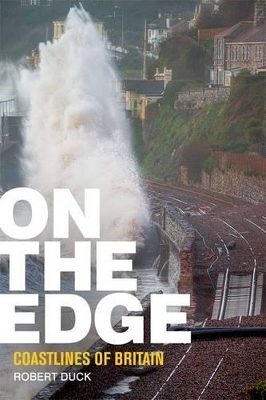
On the Edge
Coastlines of Britain
Seiten
2015
Edinburgh University Press (Verlag)
978-0-7486-9761-8 (ISBN)
Edinburgh University Press (Verlag)
978-0-7486-9761-8 (ISBN)
A first evaluation of the physical impact of railway construction on the British coast
The building of railways has had a profound but largely ignored physical impact on Britain's coasts. This book explores the coming of railways to the edge of Britain, the ruthlessness of the companies involved and the transformation of our coasts through the destruction or damage to the environment.
In many places today, railways are the first defence against the sea and similarly the embankments of long-closed lines act as sea walls. It is ironic, at a time when climate change is very much favouring rail as a means of transport, that many lines are increasingly exposed to extreme weather and the very actions associated with their construction have exacerbated coastal erosion. With the benefit of hindsight, many coastal railways have been built in locations that would not have been chosen today.
As our climate changes and storminess potentially increases, what might be the implications for some of Britain's lines on the edge?
Key features:
First evaluation of the physical impact of railway construction on the British coast Unique combination of environmental and historical researchTimely given the impact of the storms of January and February 2014 Covers the breaching of the South Devon, Cambrian and Cumbrian coastal lines
The building of railways has had a profound but largely ignored physical impact on Britain's coasts. This book explores the coming of railways to the edge of Britain, the ruthlessness of the companies involved and the transformation of our coasts through the destruction or damage to the environment.
In many places today, railways are the first defence against the sea and similarly the embankments of long-closed lines act as sea walls. It is ironic, at a time when climate change is very much favouring rail as a means of transport, that many lines are increasingly exposed to extreme weather and the very actions associated with their construction have exacerbated coastal erosion. With the benefit of hindsight, many coastal railways have been built in locations that would not have been chosen today.
As our climate changes and storminess potentially increases, what might be the implications for some of Britain's lines on the edge?
Key features:
First evaluation of the physical impact of railway construction on the British coast Unique combination of environmental and historical researchTimely given the impact of the storms of January and February 2014 Covers the breaching of the South Devon, Cambrian and Cumbrian coastal lines
Robert Duck is Dean of the School of Environment at the University of Dundee, and Professor of Environmental Geoscience. He is the author of This Shrinking Land: Climate Change and Britain's Coasts, (DUP, 2011). His research specialises in coasts and estuaries, and furthering the public understanding of science and climate change.
| Erscheint lt. Verlag | 31.1.2015 |
|---|---|
| Zusatzinfo | 55 colour illustrations, 2 colour line art |
| Verlagsort | Edinburgh |
| Sprache | englisch |
| Maße | 138 x 216 mm |
| Themenwelt | Natur / Technik ► Fahrzeuge / Flugzeuge / Schiffe ► Schienenfahrzeuge |
| Geschichte ► Allgemeine Geschichte ► Zeitgeschichte | |
| Geisteswissenschaften ► Geschichte ► Regional- / Ländergeschichte | |
| Naturwissenschaften ► Biologie ► Ökologie / Naturschutz | |
| Naturwissenschaften ► Geowissenschaften ► Geografie / Kartografie | |
| Technik ► Umwelttechnik / Biotechnologie | |
| ISBN-10 | 0-7486-9761-6 / 0748697616 |
| ISBN-13 | 978-0-7486-9761-8 / 9780748697618 |
| Zustand | Neuware |
| Haben Sie eine Frage zum Produkt? |
Mehr entdecken
aus dem Bereich
aus dem Bereich
St. Moritz – Zermatt : die Traumreise im langsamsten Schnellzug der …
Buch | Hardcover (2023)
Verlag Berg & Tal
CHF 25,90
Betriebsmaschinendienst, Einsatz bei den Bahnbetriebswerken und …
Buch | Hardcover (2024)
EK-Verlag
CHF 68,90
Buch | Hardcover (2023)
GeraMond (Verlag)
CHF 41,90


